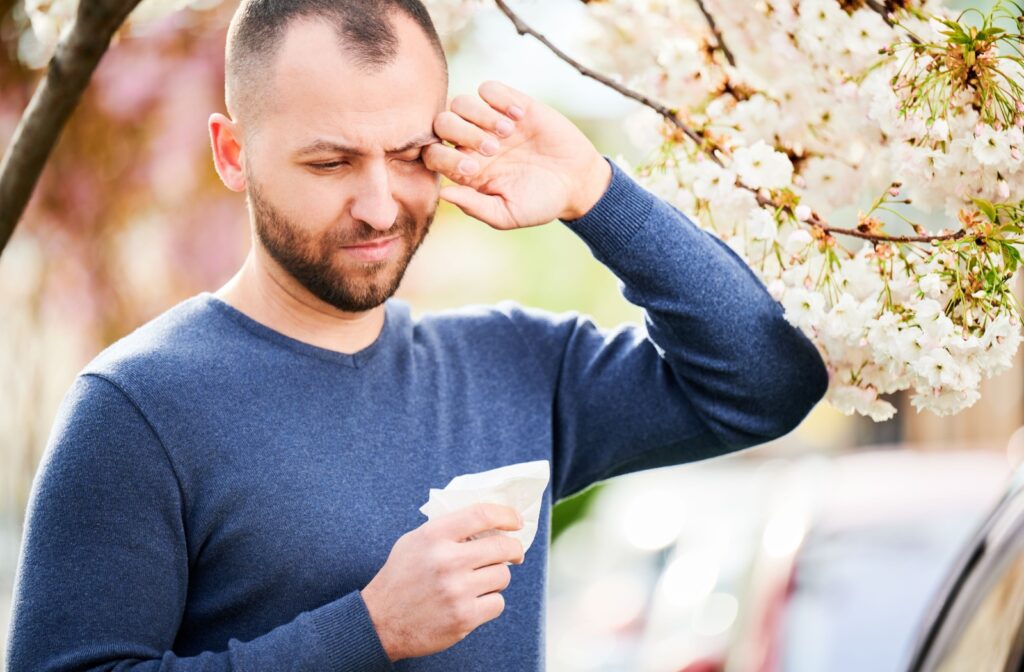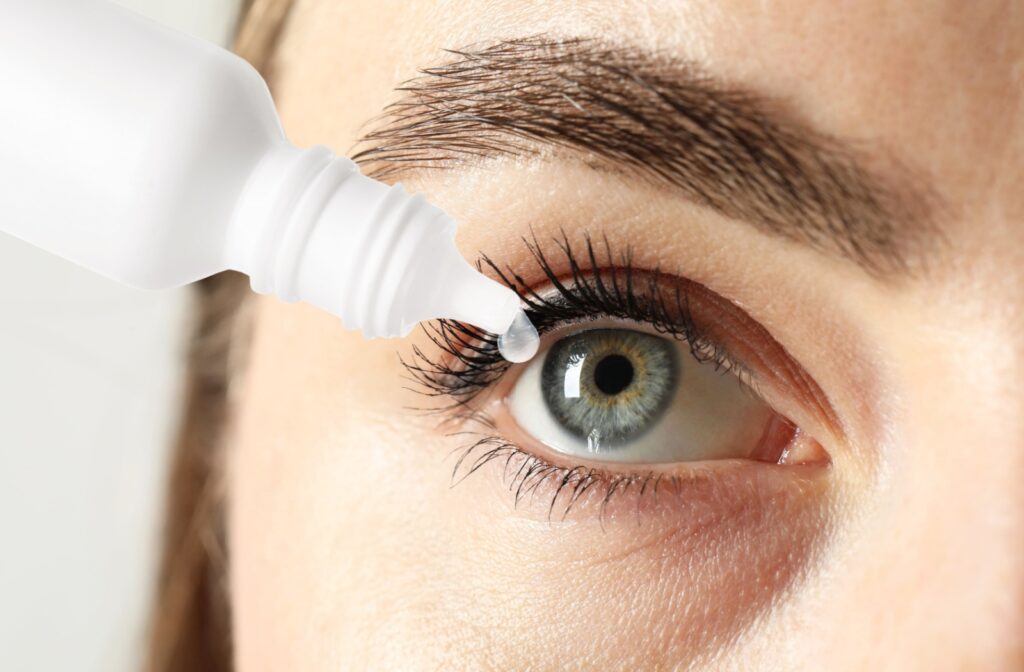Dry, itchy eyes are a common complaint during allergy season, and many people assume their discomfort is just a reaction to pollen or dust. But sometimes, those gritty, irritated eyes point to something more lasting than seasonal allergies. Allergies can contribute to dry eye symptoms, but dry eye disease is a separate condition that often requires targeted treatment.
Understanding how these two issues interact can help you find lasting relief and protect your long-term eye health.
What Is Dry Eye Disease?
Dry eye disease occurs when your eyes can’t produce enough high-quality tears to keep them lubricated. This condition impacts millions of people around the world and goes far beyond the occasional dryness you might experience from staying up late or spending too much time in front of a screen.
There are two main forms of dry eye disease:
- Aqueous deficient dry eye: Your tear glands don’t produce enough tears to keep your eyes hydrated.
- Evaporative dry eye: Your tears evaporate too quickly, often due to poor tear quality or issues with the oil-producing glands in your eyelids.
Symptoms of dry eye disease can include:
- A gritty, scratchy feeling in the eyes
- Blurred vision
- Redness and irritation
- Light sensitivity
- Excessive tearing (a response to eye irritation)
Unlike episodes of dry eyes caused by short-term factors, dry eye disease is often chronic and requires tailored treatments to address its root causes.
How Allergies Affect Your Eyes
Allergies occur when your immune system overreacts to harmless substances, such as pollen, dust, or pet dander. This overreaction can trigger eye allergies, also known as allergic conjunctivitis.
Symptoms of eye allergies often include:
- Itchy, watery eyes
- Redness and swelling
- Burning sensations
- Increased tear production
Eye allergies can disrupt the function of your tear film (the protective layer of tears covering your eyes), leading to symptoms of dryness and discomfort. While allergies don’t directly cause dry eye disease, they can worsen its symptoms or mimic its effects.
The Connection Between Allergies & Dry Eye Disease
The most significant link between allergies and dry eye disease lies in the inflammation they can cause. Allergic reactions in the eyes can lead to inflammation of the tear glands, which may disrupt tear production and quality. This can result in:
- A reduced ability to maintain a stable tear film
- Increased tear evaporation due to inflammation
Additionally, allergy sufferers often rub their eyes to relieve itching, which can irritate the ocular surface and exacerbate dryness. The result? A frustrating cycle of discomfort that feels like it has no end.
Diagnosing & Managing Allergy-Related Dry Eyes
If your eyes frequently feel irritated and your go-to remedies aren’t working, it might be time to visit an eye care professional. They can assess whether your symptoms are due to allergies, dry eye disease, or a combination of both.
Diagnosis
An eye care professional will likely:
- Review your medical history and symptoms
- Conduct tests to measure your tear production and quality
- Examine your eyes for signs of inflammation or damage
This evaluation helps differentiate between allergies and underlying conditions like dry eye disease that require targeted treatments.
Dry Eye Treatment Options
If allergies are contributing to your dry eye symptoms, tackling both issues is important for relief. Here’s how you can manage them effectively:
Lifestyle Adjustments
Make small changes to your daily routine to alleviate symptoms, such as:
- Using a humidifier to add moisture to the air
- Wearing wraparound sunglasses to shield your eyes from allergens
- Taking breaks from screens to avoid prolonged eye strain
- Washing your hands and avoiding rubbing your eyes
Over-the-Counter Solutions
- Artificial tears: Lubricating eye drops can temporarily alleviate dryness. Choose preservative-free options for extended use.
- Allergy-specific eye drops: These help reduce itching and swelling caused by allergic reactions, potentially minimizing dry eye symptoms.
Professional Treatments
For persistent or severe symptoms, your doctor may recommend advanced solutions, such as:
- Prescription eye drops tailored for inflammation or tear production issues.
- Punctal plugs, which block tear drainage and help retain moisture.
- Intense pulsed light therapy (IPL) to reduce inflammation and promote healthier tear glands.

Preventing Allergy-Related Dry Eye Symptoms
Preventive care is one of the best ways to minimize discomfort. Consider these strategies to keep allergy-related dry eye symptoms at bay:
- Identify your allergy triggers and take steps to avoid them (e.g., keeping windows closed during high-pollen days).
- Maintain clean, allergen-free indoor spaces by vacuuming frequently and using air purifiers.
- Follow a balanced diet rich in omega-3 fatty acids to support eye health.
- Stay ahead of your allergies by taking antihistamines or other allergy medications as prescribed.
Proactively managing allergies and prioritizing eye care can go a long way in reducing flare-ups and improving your overall quality of life.
Take Action for Healthier Eyes
Allergies and dry eye disease often go hand-in-hand, but with the right approach, you can break the cycle of discomfort. Identifying the root cause of your symptoms is the first step toward relief.
If you’re struggling with persistent dry eye symptoms, it’s time to seek help. Schedule an appointment with West Valley Dry Eye today. Our experienced team is dedicated to diagnosing and treating the underlying causes of your symptoms, so you can enjoy clear, comfortable vision again.
Start your path to healthier eyes by booking your appointment online or giving us a call. Relief is closer than you think.


